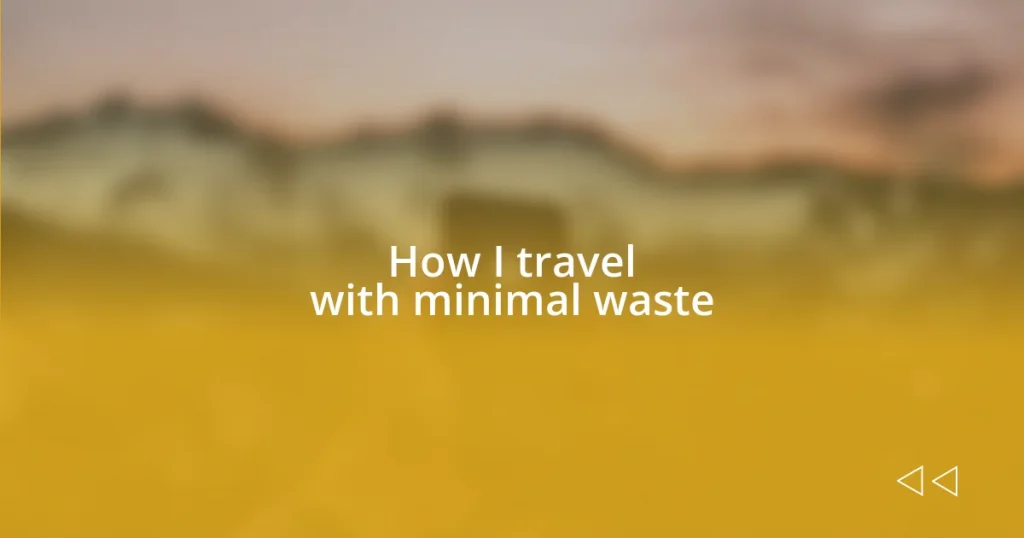Key takeaways:
- Minimal waste travel enhances the travel experience by prioritizing sustainability, fostering connections with locals, and reducing environmental impact.
- Practical strategies for low waste trips include using reusable items, choosing eco-friendly transportation, and supporting local economies.
- Engaging in local sustainable practices, such as community projects and workshops, deepens cultural understanding and promotes environmental responsibility.

Introduction to minimal waste travel
Traveling is often seen as a guilty pleasure, but what if we could savor the joy of exploration while leaving a lighter footprint? Minimal waste travel isn’t just about reducing trash; it’s about nurturing our planet and crafting meaningful experiences. I remember a trip to a coastal town where I chose reusable containers for my meals instead of relying on single-use plastic. The satisfaction of eating a delicious local dish while knowing I wasn’t contributing to waste changed my perspective forever.
When I embarked on my first minimal waste journey, I was surprised by how little I actually needed. Packing my belongings in a small, eco-friendly bag made me rethink the concept of necessity. Have you ever stood in front of your closet and wondered which clothing items you truly wear? That experience forced me to prioritize versatility and simplicity, leading to unforgettable moments unburdened by excess.
At its core, minimal waste travel empowers me to connect more deeply with the places I visit. By focusing on experiences rather than material possessions, I’ve discovered local hidden gems—like a charming café where the owner served coffee in upcycled mugs. Isn’t it fascinating how reducing waste can enhance our connection to both people and places?

Benefits of traveling sustainably
Traveling sustainably offers a profound sense of fulfillment that goes beyond sightseeing. I fondly recall a hiking trip where I brought my own water bottle and snacks in reusable pouches. Not only did I save money, but I also felt a sense of camaraderie with nature, knowing that my choices helped preserve the environment for future adventurers.
Another incredible benefit is the opportunity to support local economies. When I opted for local accommodations instead of global chains, I discovered authentic experiences and made friendships with locals who shared their stories and traditions with me. Whether it was enjoying a homemade meal or learning about their crafts, I found that my travels became richer and more meaningful.
I truly believe that embracing sustainable travel cultivates a greater appreciation for our planet. It strikes me how the simple act of avoiding plastic not only helps the environment but also inspires others to take similar steps. So, imagine how powerful it is to witness waves gently washing away littered shores, knowing I played a part in that transition. This commitment fosters a community of conscious travelers, creating a ripple effect that can lead to significant change.
| Benefit | Description |
|---|---|
| Fulfillment | Feeling connected to nature and your surroundings through mindful choices. |
| Supporting Locals | Enhancing travel experiences by engaging with local communities and economies. |
| Appreciation for Planet | Instilling a sense of responsibility towards the environment and inspiring others. |

Planning a low waste trip
When it comes to planning a low waste trip, having a solid strategy is essential. I’ve learned to start my journey by researching eco-friendly options, from transportation to accommodations. For instance, I once planned a trip where I prioritized train travel instead of flying, inspired by the serene landscapes I could view en route. The whole experience felt more connected and genuine, and knowing my transport choice was less harmful to the environment was a rewarding motivation.
Here are some practical steps I recommend for planning:
- Choose local transportation: Opt for buses, trains, or bikes to reduce carbon emissions.
- Research zero-waste accommodations: Look for hotels or hostels that prioritize sustainability and minimize waste.
- Create a reusable travel kit: Include items like a water bottle, utensils, and a coffee cup to avoid single-use options.
- Plan meals ahead: Find restaurants that focus on local, seasonal produce, which can lower packaging waste.
- Pack light and smart: Bring versatile clothing and toiletries in reusable containers to limit what you need to buy or dispose of while traveling.
By thoughtfully considering these elements, you not only enhance your travel experience but significantly lower your impact on the planet. It truly makes a difference and can even transform the way you see your surroundings.

Eco-friendly packing tips
When it comes to packing eco-friendly, one of my top tips is to utilize reusable bags. I can’t tell you how many times I’ve reached for a sturdy tote to keep my clothes organized. Not only does it reduce the reliance on plastic, but it also adds a personal touch to my travel gear. Plus, I love showcasing vibrant fabric patterns wherever I go—it’s like carrying a piece of my personality on my travels!
Another strategy I swear by is choosing multipurpose items. For instance, my travel blanket doubles as a picnic backdrop and a cozy wrap on chilly flights. This versatility cuts down on extra stuff, making my bag lighter and my mind freer. Have you ever thought about how much happier you’d feel with a streamlined pack? I know I always breathe easier when I can reduce clutter.
Lastly, I opt for solid toiletries instead of liquids, which not only helps me abide by travel regulations but also eliminates the risk of leaks. Just imagine opening your suitcase to find everything intact—so refreshing! I remember switching to a solid shampoo bar during one trip and was thrilled by how little space it took in my bag. It felt great knowing I was making a positive choice for the environment without sacrificing my routine. Every step counts, and packing thoughtfully can mean so much for our planet!

Sustainable transportation options
When I think about sustainable transportation, public transit immediately comes to mind. During my last trip to Europe, I hopped on trains and buses, relishing every moment as I watched the landscape transform outside my window. It’s amazing how much more connected you feel to a place when you’re not just flying over it—it’s like the world unfolds right in front of you.
Bike sharing is another fantastic option that I often explore while traveling. On one particular trip to Amsterdam, I rented a bike for the day and pedaled through the city’s charming streets. There’s something liberating about cycling; it made me feel like a local rather than just a tourist. Plus, the health benefits are a sweet bonus—who doesn’t love getting a little exercise while taking in the sights?
Ridesharing apps now offer eco-friendly vehicles, and I consider them whenever I’m in a pinch or need a quick lift. The last time I used one, I chose a carpool option, and it turned out to be a delightful experience. I shared the ride with two other travelers, and we spent the journey swapping stories about our adventures. This not only helped reduce emissions but also created an unexpected camaraderie that truly enriched my trip. Isn’t it fascinating how small decisions in transportation can lead to such meaningful connections?

Reducing waste while traveling
While traveling, I focus on minimizing waste, especially when it comes to food. I usually carry a reusable container for leftovers, which not only saves me from tossing food but also comes in handy for snacks on the go. I still remember a magical evening in Italy when I asked a local restaurant to pack my extra pizza slice; there’s something so satisfying about enjoying a meal from a previous outing, allowing me to savor the memory while keeping waste at bay.
Shopping for souvenirs can also contribute to waste if we’re not careful. I’ve had my share of impulse buys, but now, I lean towards choosing items that are locally made and sustainable. For example, during a recent trip to Mexico, I sought out a small artisan market where I found beautiful handwoven bags crafted from recycled materials. Each time I carry that bag, it’s a reminder of the vibrant culture and the importance of supporting eco-friendly practices.
I’ve found that planning eco-conscious activities enhances my travel experience. One instance stands out: I joined a beach cleanup while visiting a coastal town. Not only did I meet like-minded travelers, but the sense of accomplishment we shared as we collected waste from the shore was profound. Have you ever felt that rush of connection when working toward a common goal? It’s incredible how actively reducing waste can transform the way we travel, making it more meaningful and impactful.

Engaging in local sustainable practices
When I travel, I love diving into local traditions that promote sustainability. In one quaint village in Portugal, I joined a community gardening project where locals taught me how to cultivate native plants without harmful chemicals. It was heartwarming to see residents come together, sharing tips and laughter while nurturing the earth. Have you ever participated in something that made you feel part of a community, even if just for a moment? It’s those experiences that stay with me long after the journey ends.
Engaging with local artisans is another way I try to support sustainable practices while exploring new places. Recently, in a market in Bali, I met a craftsman who made beautiful jewelry from upcycled materials. As he shared his story, I realized how my purchase not only supported his livelihood but also contributed to reducing waste. It felt empowering to know that every piece I bought carried a narrative of resilience and resourcefulness. Isn’t it amazing how buying something can lead to a deeper understanding of a culture?
I also actively seek out eco-friendly workshops during my travels. In Thailand, I attended a cooking class that emphasized the use of local, organic ingredients. Not only did I learn to whip up delicious dishes, but leaving with knowledge of sustainable cooking practices enriched my travel experience. It sparked my curiosity about the foods I consume daily. Have you ever thought about how your culinary choices impact the environment? Engaging in these local practices not only reduces my carbon footprint; it transforms the way I connect with the places I visit.















